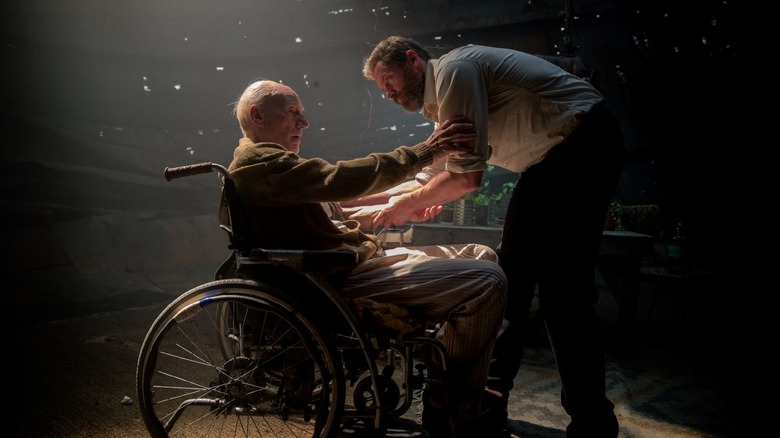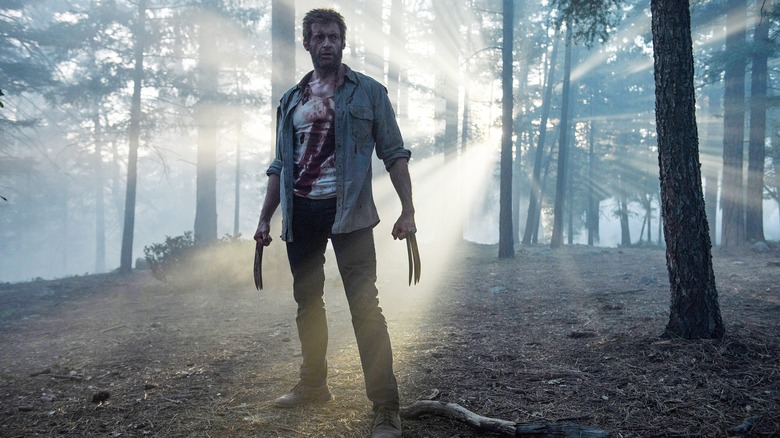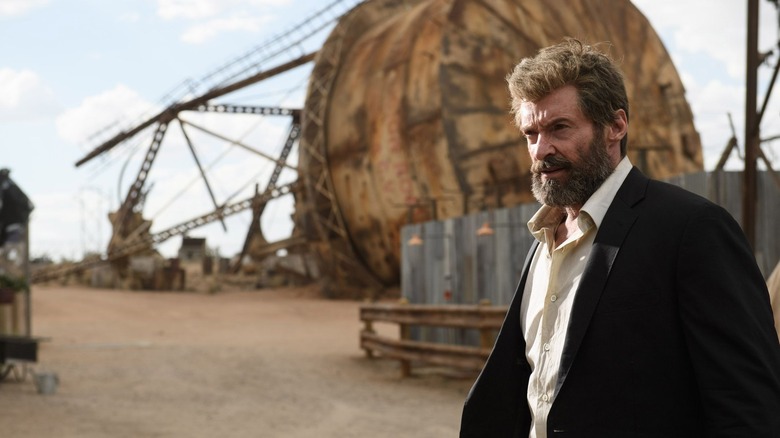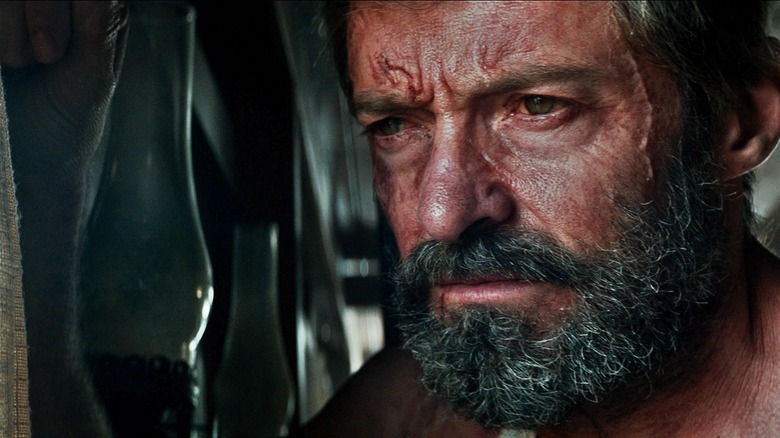Logan Ending Explained: The X-Men Must End
James Mangold's 2017 superhero film "Logan" is unique within the genre for the simple fact that it ends.
Inspired by the Mark Millar and Steve McNiven comic book series "Old Man Logan," Mangold's film takes place in a future of the X-Men universe wherein the man once known as Wolverine has grown into a scarred, defeated, sad, kind of pathetic elderly man. Professor X (Patrick Stewart) is pushing 100 and is losing control of his psychic powers, and Logan (Hugh Jackman) can no longer heal quickly. Both men are at the ends of their lives. The world is dry, dusty, and barren, and the X-Men long ago disbanded and died. The X-Men comics that you read are merely inaccurate portrayals of the tragic, violent stories that the "real world" X-Men actually experienced.
This "last hurrah" for Wolverine was constructed because the character had been featured in nine films, and retirement seemed appropriate. Also, Jackman was nearly 50 at the time of shooting, and understood that he would eventually have to age out of the role. "Logan," however, wasn't interested in giving Wolverine a flashy death wherein he would be permitted to sacrifice himself in a spectacular way. Instead, the movie took a good hard look at the kind of people superheroes really are, and the kind of deaths they are all destined for: Sad, distant deaths, perhaps appreciated by only a very few, set in a world they were unable to save. If all you have are superpowers, you tend to see every problem as a superhero fistfight.
In short, Logan's ending was always going to be tragic.
The ultraviolent class
It's important to acknowledge that "Logan" takes a very dim view of superheroes. According to Mangold and his co-screenwriters Michael Green and Scott Frank, superheroes — for all their flash and nobility — are in fact dark souls who live by a code of violence. Superheroes are soldiers whose only recourse in any major crisis is to attack. They punch, fire eye beams, slash with claws, throw razor disks, stab, shoot.
Comic books make the Ultraviolent Class — to coin a phrase — seem palatable by setting their tales in worlds of childish moral absolutes; it's okay if superheroes murder supervillains by the thousands, because superheroes are "good guys" and supervillains are "bad guys." There is no nuance in a world ruled by violence. There is only violence as a solution. The simplistic moral will be dictated by those who enact the violence. When Thanos kills thousands on a battlefield, it's terrible. When Iron Man kills Thanos and his thousands of minions with a snap of his fingers in "Avengers: Endgame," it's triumph.
Of course, thinking realistically for a moment, a life devoted to violence, even superhero violence, would leave a deep scar on the soul. Logan, after living for hundreds of years and murdering untold thousands of people, is now facing an inauspicious death full of regret. His violence-forward superhero thinking has earned him a late-life anonymous job as a chauffeur. He has earned no fame, no honor, no money. He and Professor X are essentially homeless. New villains have more resources — and more recourse — than he ever had. The bad guys will win out in the end. Superheroes will wither away, traumatized by the deaths they have caused.
Unforgiven
The plot of "Logan" takes multiple cues from Clint Eastwood's 1992 film, "Unforgiven." Logan, like Eastwood's William Munny, is living in solitude, hoping it can serve as penance for a life badly lived. Logan is swept up in a plot involving a young girl named Laura (Dafne Keen), who seems to have the same claws and healing powers Logan once did. He finds that Laura was grown in a lab to be a super-powered human weapon and is now being hunted after the experiment was decided to be a failure. Because Laura was made using Logan's stolen DNA, she is technically his biological daughter.
The "growing super soldiers in a lab" trope is so common in superhero storytelling that audiences may simply take it in stride. It does, however, highlight that superheroes are, even in the eyes of their own universe, merely weapons. Even Logan, in the lore of X-Men comics, was once known as "Weapon X." It's up to Logan to protect Laura and transport her and other kids to safety. The implication is that the super-powered kids will not form their own X-Men team once they are safe, but will live in peace, free of persecution. Logan is not using his last ounces of strength to continue the legacy of the X-Men; that ended long ago. No, Logan has signed up to sacrifice himself in order to ensure that X-Men will not continue. The X-Men must end. Superheroes must end. Logan elects to give his life to make sure that happens.
The children will not become superheroes. They will do the opposite: They will live in peace.
The end of the story
Thanks to the overwhelming success of the Marvel Cinematic Universe, audiences have been trained to accept that superhero characters needn't ever retire. One of the primary raisons d'être of the MCU is its perpetuity. Like with the comic books themselves, writers will continue these stories for as long as possible. As such, the characters will be eternally trapped in their own second acts. They have origin stories, they learn how to be superheroes, they grow in power and estimation, and then they stay there, unable to leave.
After a while, for the superhero, each supervillain must come to resemble the rock of Sisyphus; on a long enough timeline, being a superhero is ultimately a symbol of futility. Because the adventure must continue (since the character is popular and bankable enough to stay in the consciousness forever), they will never be allowed to die. When a superhero can finally meet their end, it's an aberration — and a relief.
Batman was allowed to finally leave the biz at the end of "The Dark Knight Rises." The Eternals, after so many thousands of years of being alive, were granted the gift of anonymity; their story was finally permitted to be over. "Logan" was permitted to look back on his life, see a dark past, and step out with as much dignity as he could muster. Logan died. The X-Men died. Superheroes died. And the world is now a little more peaceful.
Despite what "Logan" said, however, rumors are already abound about the next Wolverine. Logan died, but will still be dragged kicking and screaming back into his second act by the MCU. Wolverine will live on. That immortality is his blessing. It is also his curse.



